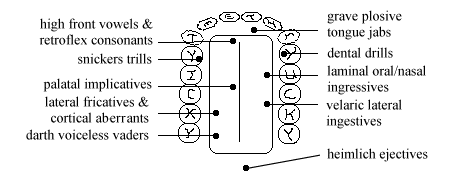Many years ago, in places not that far away, many people believed in the "science" of phrenology, through which one could discern many things about one's patient's personality by examining the bumps on their head. Quite a silly idea to be sure, phrenology has gone the way of the great lizards. In more recent years, there has come upon the scene the "science" of phonology, through which one hopes to find something out by pushing around symbols on a piece of paper that allegedly stand for sounds. To quote Gary Bruff, the eminent discourse pragmaticist, out of context: "Clever. Wrong, but very clever." Much as the lumpiness of the head tells the true scientist nothing of the disposition of the lumpy subject, phonology, too, is an empty-headed science. Perhaps as some (Jones, "Phonetics for the Hearing Impaired") have wimpily noted, there is a underlying fault with phonology: phonetics. But regardless of the cause, the flaw exists.
As I sat, early one morning, cogitating on the merits and defects of these two pseudo-sciences, it suddenly came to me that there is indeed something to be salvaged from these intellectual wreckages. Combining the strengths, and discarding the faults, I have discovered a new science: phronology--the study of the physical features of the mouth to discover what sounds exist in a language and how they are grouped. Figure 1 is the result of my preliminary work and gives some of the 'wear spots' and their phonemic correlates. Phronology not only indicates the exact phones present in a language, but even ranks them in frequency: the greater the wear, the greater the use. Thus, phronology obviates the need for phone frequency tables. The contours of the mouth, no doubt, speak volumes.
 |
| figure 1. Examples of Phronological Evidence (in a somewhat idealized speaker's mouth) |
I should note in passing the sister science of phronology: phenology--the study of one's head position during discourse to determine personality characteristics. The science of phronology is obviously very new and in need of many researchers to push its outer boundaries. Alas, my own work is to pressing for me to turn any further aside, so I must pass the torch on to another, preferably one with a laminal lingual protrusion who holds their head upright when speaking (the only kind to trust, you know).
Skippy Id | Acme Looniversity |